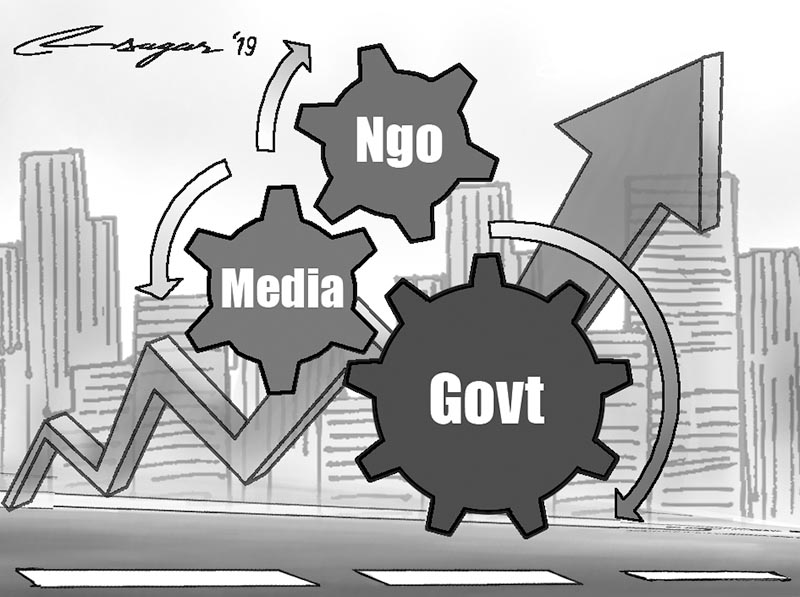Civil society and media: Give them their due
The government must create an environment conducive for the functioning of CSOs and the media by minimising the restrictions on them. It is necessary for the civil society to engage actively in public debates on social security and corruption
Civil society is considered to be one of the key players in a democracy, the people’s regime, to put forth the people’s voice in a more logical and judicial manner. But civil society is often misunderstood as an organisation that reaps donor-funded dollars. And neither should it be understood as an “establishment-friendly” organisation.
Civil society, normally represented by the organisations that are engaged in advocating people’s rights, is the ‘third sector’ of society, which works in between the government sector and the private sector, promoting the interests and will of the citizens. More often, it is even misinterpreted as those working in the sectors of health, environment and economic rights. However, it has been playing an important role in enhancing transparency and good governance in developing countries by contributing to increased public debate on issues surrounding the formulation and implementation of government budgets as well as in supporting greater transparency of public revenue. The civil society groups may establish ties with political parties and the state, but they must retain their independence, and not seek political power for themselves.
Civil society and the media can together play an important role in building a culture of integrity in an underdeveloped country and its society. While civil society has a key role in bridging the government bodies and the people at the grass-roots level, the role of the media is like a watchdog by exposing the corruption in society and providing accurate, balanced and timely information that is relevant to the public interest. A democratic state cannot maintain stability unless it is effective and legitimate, and has the respect and support of its citizens. For this purpose, transparency is the key factor, which can be ensured by an effective role of the media.
Over time, many key challenges have emerged in the surveillance and advocacy work of both the civil society and media. In this context, the government has to come up with adequate number of promotional programmes to address the issue. Safeguarding press freedom and enforcing deregulation could promote a positive attitude in the public. For this, dialogue, cooperation and trust between the government, civil society and the media are necessary.
Our government needs to create an environment conducive for the functioning of civil society organisations (CSOs) and the media by minimising the restrictions on them. On the other hand, it is necessary for the civil society to engage actively in public debates on social security strategies and corruption. Efforts are needed to increase civil society and government integrity-building partnerships in situations where such mutually-beneficial relationships are lacking or inadequate.
Existing laws and legal frameworks of Nepal tend to restrict CSOs in many ways. Media and CSO coalitions are needed to create a double self-regulatory mechanism as agreed by the CSOs and policy makers to ensure full representation of women and the marginalised population. This is important to create an environment of confidence among all – CSOs, policy makers and the public. CSO movements in Nepal have been successful in defeating several rules and regulations restricting CSO activities.
The government needs to have minimal legal and administrative regulations governing the media and civil society. In addition, the government has to focus on building the capacity of public institutions and promoting participatory democracy to deliver services and respond to citizens’ needs. Participatory democracy involves a wide range of issues – formulating policies, having the civil society join the process of governance, entering into public private partnerships and public dialogue. In the context of South Asian countries, despite the increase in the number of non- governmental organisations and an active civil society, participation in governance has been limited. Mostly in South Asian countries, paternalistic policies have become widespread, leading to corrupt practices and non-accountable and non-transparent government activities. For good governance, there should be effective participation of the citizens, transparency, responsiveness, consensus orientation, equity and inclusiveness, the rule of law, accountability and strategic vision. Innumerable administrative reform commissions have produced
no appreciable impact on the quality of good governance. There should, therefore, be external pressure from the citizens on the system to improve through the Right of Information Act, Consumer Protection Act, e-governance, public interest litigation and the like.
Civil society has an important role to play in a democratic country. A strong and reliable civil society can represent the interests of the people and the community and serve as a check on the misuse of power by the state. Civil society organisations tend to be more active in stimulating political awareness among the public and encouraging their political participation to protect their own interests. Through these efforts, the governments can become more accountable, honest, accountable, transparent and responsive to the public demands, which will win the support of the people and strengthen their legitimacy.






